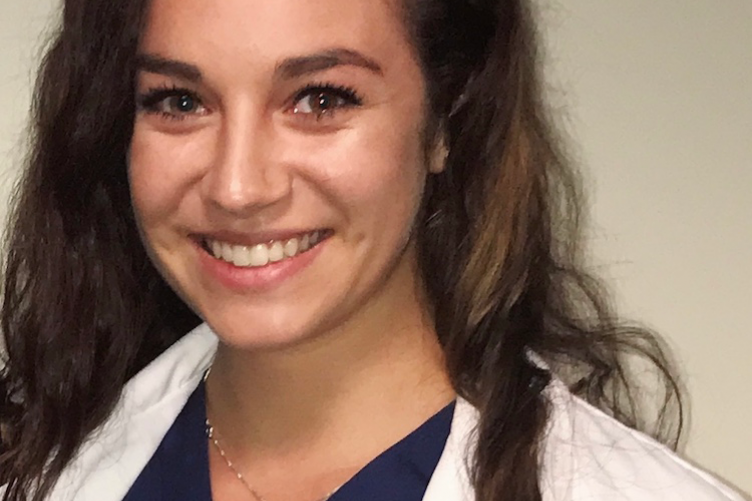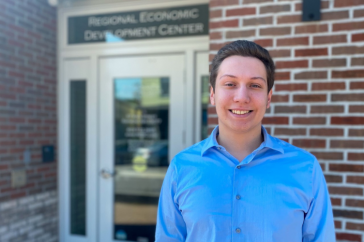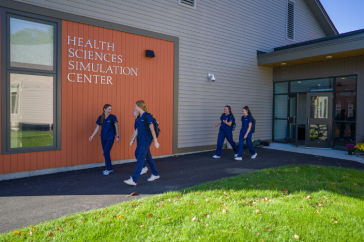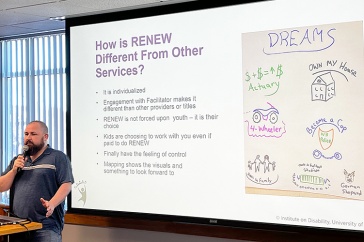
Nursing major Rebecca McCann ’21 (courtesy photo)
In a normal year, nursing students begin their senior practicum during the last semester before they graduate. But as COVID-19 has repeatedly proven, nothing has been normal since the pandemic began.
Rebecca McCann ’21 did her clinical work in the emergency department (ED) at Elliot Hospital from mid-December through Jan. 31. Elliot Hospital is a 296-bed acute care hospital in Manchester, New Hampshire. It is home to a level II trauma center, as well as the only pediatric emergency department in the state.
In November, faculty in the College of Health and Human Services reached out to community partners to propose their students start the practicums early. Elliot Hospital was among others eager to agree. The ED was experiencing a high volume of patients, including many with COVID.
“I was fortunate enough to have been selected by the Elliot to begin early,” McCann says. “COVID definitely impacted my experience. Not only did I have to adapt to working in an incredibly busy department, but I had to work alongside doctors and nurses who also were adjusting to working in a pandemic.”
UNH Sophomore Receives COVID Vaccine
Stephanie Millios is a sophomore in UNH’s biomedical laboratory science program. She works part time at Exeter Hospital in New Hampshire as a phlebotomist, drawing blood from those who are hospitalized as well as outpatients. Which is why, when she had the chance to receive the COVID-19 vaccine, she took it. The job is considered high risk.
“At first I was a little nervous to get the vaccine just because it was new. However, I did a lot of research and decided it was very important for me to get it because it’s going to make a difference on ending this pandemic,” Millios says. “I also wanted people around my age not to be afraid of getting the vaccine.”
“Everyone I work with is so supportive and encouraging of me being a lab student.,” Millios says. “I am very thankful that Exeter hospital hired me, and I am able to work and gain experience that will help me become a better student and when I graduate, an excellent lab scientist.”
Under the direct supervision of a registered nurse, McCann’s job had her caring for patients of various ages, backgrounds and acuity levels. “I was challenged to always think on my feet, prioritize my care, find evidenced-based practices to care for a variety of conditions and to tailor my care to meet the needs of every individual,” she says.
McCann, of South Grafton, Massachusetts, worked 36 hours a week during one of the busiest and most stressful times the ED had seen in recent years. While there were times when she was overwhelmed caring for Covid-19 patients, she says it allowed her to feel like “a real nurse.”
“I felt like I was fully immersed and experienced everything a true emergency department nurse undergoes during their daily shift,” McCann says. “The pandemic also taught me how to constantly adapt to change, and most importantly, how to practice self-care for myself in order to be able to provide the best possible care for my patients.”
Hannah Miller ’21 also did her clinical at Elliot Hospital. She was assigned to pediatric adolescent unit but often worked in the neonatal intensive care unit and the maternity unit as well. When her assigned supervisor became ill, several other nurses stepped up to take her place.
“I have been fortunate to meet and work with many people and learn their various techniques and skills. It has shown me that every nurse has their own flow to their shift and there is not always one correct way to do things,” the Acton, Maine, resident says.
“I felt like I was fully immersed and experienced everything a true emergency department nurse undergoes during their daily shift."
Working 36+ hour shifts, sometimes as three 12-hour shifts in a row, could be hard at times but Miller viewed it as preparation for the real world, saying, “I imagine this experience, compared to the typical practicum, really helps us understand what an average work week will be like once we graduate. I found myself not really knowing what to expect and just going with the flow, which is often how things are in the workforce, especially now, with COVID.”
The weeks she worked spanned Christmas and New Year’s, something else that Miller says reflects what a career in healthcare will be like. “It felt nice to be there for children who were in the hospital during the holidays,” she says. “I feel fortunate to be a part of this new opportunity, learning how to adapt to changes, and expanding my knowledge of pediatric nursing, as it is a specialty I wish to pursue.”
Adds McCann, “My experience was far from the normal senior immersion experience, but I learned more than I could have ever hoped for.”
-
Written By:
Jody Record ’95 | Communications and Public Affairs | jody.record@unh.edu



















































